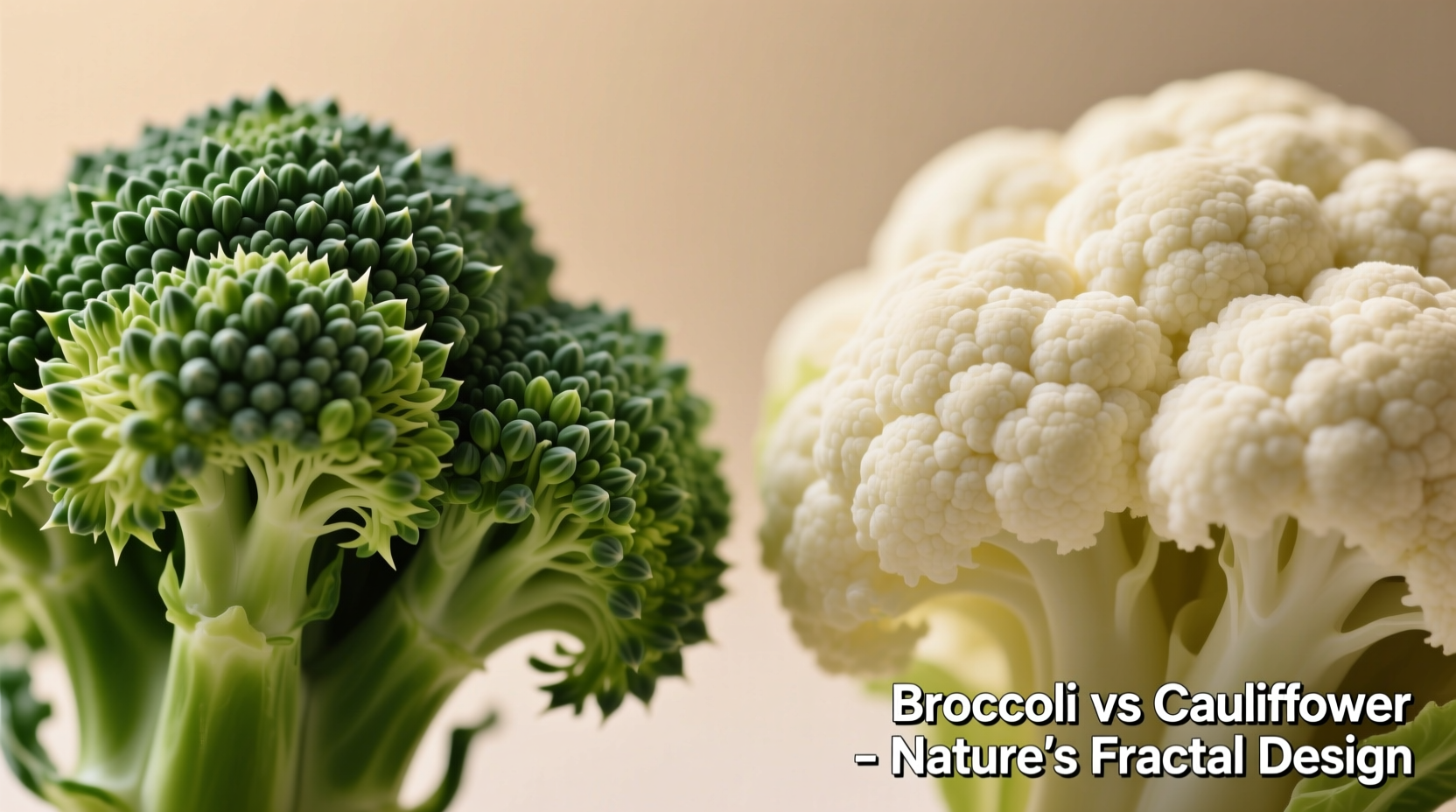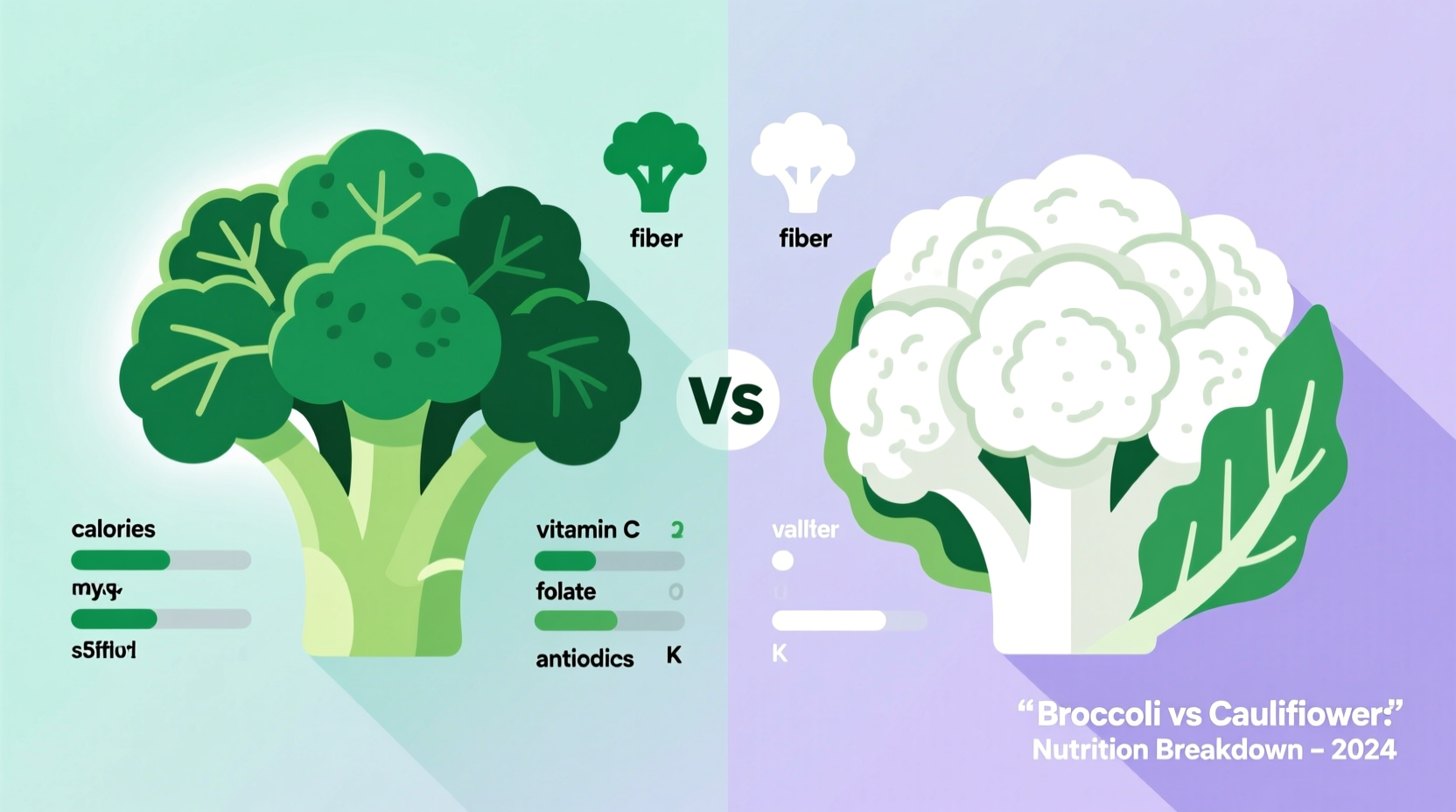Why This Nutritional Comparison Matters for Your Health
When choosing between broccoli and cauliflower, you're not just picking vegetables—you're making decisions about your long-term health. Both belong to the cruciferous family, known for cancer-fighting compounds, but their nutritional profiles differ in ways that matter for specific health goals. Understanding these differences helps you optimize your diet based on your individual needs, whether you're managing blood sugar, boosting immunity, or supporting digestive health.
Nutritional Face-Off: Head-to-Head Comparison
Let's examine the core nutritional differences using data from the USDA FoodData Central, the most authoritative source for food composition information. The following comparison uses raw, chopped vegetables per 100g serving:
| Nutrient | Broccoli (per 100g) | Cauliflower (per 100g) | Significance |
|---|---|---|---|
| Calories | 34 kcal | 25 kcal | Cauliflower has slightly fewer calories |
| Protein | 2.8 g | 1.9 g | Broccoli provides 47% more protein |
| Fiber | 2.6 g | 2.0 g | Broccoli offers 30% more fiber for digestion |
| Vitamin C | 89.2 mg | 48.2 mg | Broccoli contains 85% more vitamin C |
| Vitamin K | 101.6 mcg | 15.5 mcg | Broccoli has 555% more vitamin K |
| Folate | 63 mcg | 57 mcg | Broccoli has slightly more folate |
| Potassium | 316 mg | 299 mg | Broccoli provides more potassium |
| Calcium | 47 mg | 22 mg | Broccoli contains more than double the calcium |
| Carbohydrates | 7 g | 5 g | Cauliflower has fewer carbs for low-carb diets |
Health Benefits: Where Each Vegetable Shines
While both vegetables share many health-promoting compounds, they excel in different areas:
Broccoli's Standout Benefits
- Vitamin Powerhouse: Broccoli's superior vitamin C and K content supports immune function and bone health. Just one cup provides 135% of your daily vitamin C needs.
- Heart Health: The American Heart Association notes that broccoli's combination of fiber, potassium, and antioxidants contributes to cardiovascular protection.
- Bone Strength: With significantly more calcium and vitamin K than cauliflower, broccoli better supports bone mineralization according to research from the Harvard T.H. Chan School of Public Health.
Cauliflower's Unique Advantages
- Low-Carb Versatility: With fewer carbohydrates, cauliflower serves as an excellent substitute for higher-carb foods like rice, potatoes, and flour.
- Choline Content: Cauliflower contains more choline (44mg per cup vs 33mg in broccoli), a nutrient essential for brain health that many Americans lack according to the National Institutes of Health.
- Digestive Tolerance: Some people find cauliflower easier to digest than broccoli, causing less bloating for those with sensitive digestive systems.

Practical Guidance: Choosing Based on Your Goals
Understanding the context boundaries helps determine which vegetable serves your specific needs:
When Broccoli Is Your Better Choice
- Immune Support: During cold and flu season, broccoli's higher vitamin C content provides stronger immune system support.
- Bone Health Focus: For individuals concerned about osteoporosis or bone density, broccoli's superior calcium and vitamin K profile makes it the better option.
- Iron Absorption: The vitamin C in broccoli enhances non-heme iron absorption from plant foods, making it ideal to pair with beans and lentils.
When Cauliflower Has the Edge
- Keto or Low-Carb Diets: With fewer carbohydrates, cauliflower serves as a versatile base for rice substitutes, pizza crusts, and mashed "potatoes".
- Digestive Sensitivity: For those experiencing bloating with broccoli, cauliflower often proves gentler on the digestive system.
- Calorie-Conscious Eating: When minimizing calories while maximizing volume, cauliflower's slightly lower calorie density makes it preferable.
Maximizing Nutritional Value Through Preparation
How you prepare these vegetables significantly impacts their nutritional benefits. Research published in the Journal of Agricultural and Food Chemistry shows that cooking methods affect nutrient retention:
- Steaming: Preserves the most nutrients in both vegetables—up to 90% of vitamin C compared to boiling which can lose 50% or more.
- Raw Consumption: Eating raw preserves heat-sensitive compounds like myrosinase, which activates cancer-fighting sulforaphane in broccoli.
- Roasting: Enhances flavor while maintaining most nutrients, though high temperatures can degrade some vitamins over extended periods.
- Avoid Overcooking: Prolonged boiling leaches water-soluble vitamins into the cooking water and creates that characteristic sulfurous smell.
Addressing Common Misconceptions
Several myths persist about these cruciferous vegetables:
- "Cauliflower is just white broccoli": While they're related, they have distinct genetic profiles and nutritional compositions. Cauliflower lacks the chlorophyll that gives broccoli its green color and some associated compounds.
- "Broccoli causes thyroid problems": The goitrogens in cruciferous vegetables only pose risks for those with existing thyroid conditions who consume extremely large quantities raw. For most people, the health benefits far outweigh any theoretical risks.
- "Frozen versions are less nutritious": Flash-frozen broccoli and cauliflower often retain more nutrients than fresh varieties that have traveled long distances, according to USDA research.
Making the Right Choice for Your Plate
Instead of viewing this as an either/or decision, consider incorporating both vegetables into your diet. Their complementary nutritional profiles provide a broader spectrum of health benefits than either alone. Aim for variety in your cruciferous vegetable consumption to maximize the range of phytochemicals you receive.
For optimal health impact, include 2-3 servings of cruciferous vegetables weekly as recommended by the National Cancer Institute. Rotate between broccoli, cauliflower, Brussels sprouts, and other cruciferous options to benefit from their diverse compound profiles.











 浙公网安备
33010002000092号
浙公网安备
33010002000092号 浙B2-20120091-4
浙B2-20120091-4